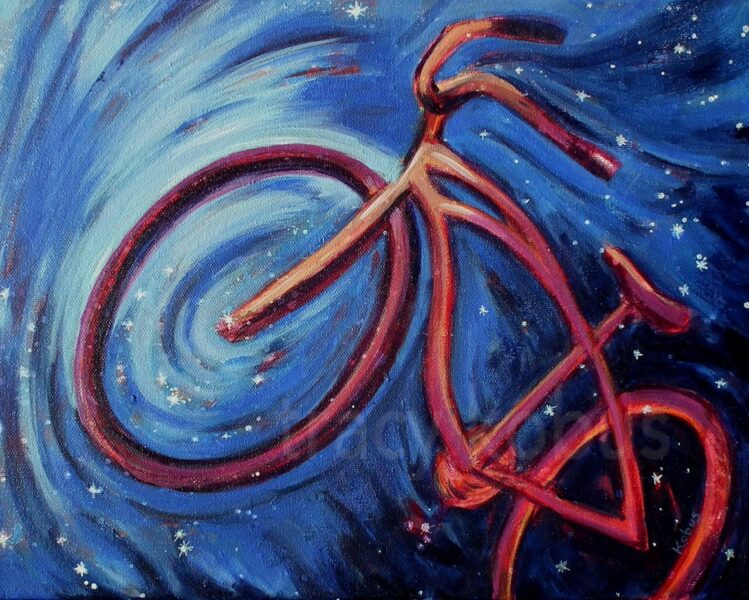Like Riding A Bike - Getting Creative Work Done

I’ve always disliked goals – maybe it’s because my goals weren’t set in reality. I tried goals to “do a painting every week”, or “make set amount of money” but it just never worked out. I think goals just can end up making you feel incapable of achieving something. And the thing is, we can’t predict the future, so how should we know what our goals should be? Life happens and we change and learn as well. Should we respond to life, or keep blindly pursuing goals?
At the same time, if we don’t have some structure, plan or strategy, none of our creative work would get done. Life just tends to take over. Over the years, I have read just “a few” books about motivation and organization and some stand out in my memory. One of the first ones I read was Stephen Covey’s “7 Habits of Highly Effective People”, first published in 1989. Even though at the time I was wary of self-help books, I just had to know what made people highly effective – and even what that meant! But something stuck with me from his book – the Time Management Matrix diagram (see a video HERE).
This is a square diagram divided into 4 areas: Urgent, Non-Urgent, Important, Not Important. Two categories will overlap depending which square you’re on. This helps you see where you spend most of your time. For example, “spending time with family” or “exercising” may be where non-urgent but important overlap. Answering a phone call may be “urgent but not important”.
The main lesson is that we don’t want to spend our whole life doing things just because they’re urgent, at the expense of less urgent but important things. And as Covey points out, to do this you have to first sort out what is most important to you. What are your values? For example, on your death bed what do you think you will wish you had done more of – apparently no one thinks “work more”.
Another motivational book that sticks out is “The Power of Habit” by Charles Duhigg. So many of our behaviors are shaped by habit – why fight against this? We can exploit our habitual tendencies by creating habits that will benefit us. It might also help to be aware of our unhealthy or unhelpful habits.
Having a habit in place can help us deal with the ever present inner critic. Typical inner critic comments are: “there’s no point in this”, “who do you think you are”, “people are going to think you’re crazy”. It’s voice is usually accompanied by feelings of avoidance and takes center stage when you’re making a change or doing something new – when there’s fear involved. The inner critic (or your ego) does not want you to do anything that will make you vulnerable.
To develop a habit, you need cues to get you started – whether it’s a particular spot you work, time of day, music you put on or coffee you drink. Cues help reinforce the habit. After awhile, instead of avoiding an activity, you want to do it, you start to crave it! Your inner critic takes a back seat. According to google it takes people an average of 66 days to form a habit – but, this must be good habits, because I don’t think bad habits take this long.
The biggest reinforcer of a habit is receiving a reward, and for me this just may be the thrill of actually spending time on these less urgent, but more important things.
There are so many books written and ideas about how to get creative work done, I think you just have to find what works for you. Other ideas out there are: getting up ridiculously early, working in 25 minute segments with a 5 minute break (apparently that is only how long our brain can focus for), bullet journaling – maybe it’s even writing down a few goals. Apparently if you write something down, it’s more likely to happen.
Personally, I am glued to my weekly planner – kind of like a bullet journal. I look one week ahead at a time, to get an idea of what I’m going to do when and making sure there is time for the important things (I realize now in writing this, that I probably got this idea from Stephen Covey). This is also because the less decisions I have to make in the day, the more I can save this energy for creative work. As well, being a morning person I like to do the things that require the most brain power early in the day – like writing this blog – I only fold laundry at night.
Figuring out what is important to you and then making a habit of it, is like riding a bike (sorry about the cliché). It is vulnerable and scary when you start, you will have lots of wipe outs, (people may laugh), then you are wobbly and tentative but eventually you are just enjoying the breeze and movement and having fun. Without even realizing it, you are doing the things that make you feel happy, allow you to grow and maybe even take you to new cool places!
Quote: Negative thoughts take away your power … – Susan Jeffers, Feel The Fear And Do It Anyway: How to Turn Your Fear and Indecision into Confidence and Action
Image above: Starmaker, 2016
